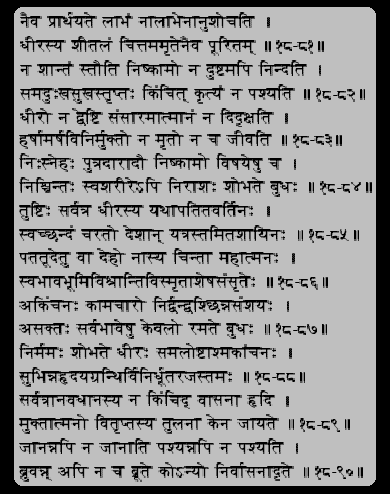



Ashtavakra said:
He neither
longs for possessions nor grieves at their absence.
The calm mind of the sage is full of the nectar of immortality. 18.81
The
dispassionate man does not praise the good or blame the wicked.
Content and equal in pain and pleasure, he sees nothing
that needs doing. 18.82
The wise man
is not averse to samsara, nor does he seek to know
himself. Free from pleasure and impatience, he is not dead
and he is not alive. 18.83
The wise man
excels by being free from anticipation, without
attachment to such things as children or wives, free from
desire for the senses,and not even concerned
about his own body. 18.84
The wise
man, who lives on whatever happens to come to him,
roams wherever he pleases, and sleeps wherever the sun
happens to set, is at peace everywhere. 18.85
Whether his
body rises or falls, the great-souled one gives
it no thought, having forgotten all about samsara in coming to rest
on the ground of his true nature. 18.86
The wise man
has the joy of being complete in himself and without
possessions, acting as he pleases, free from duality and rid of
doubts, and without attachment to any creature. 18.87
The wise man
excels in being without the sense of "me". Earth, a stone,
or gold are the same to him. The knots of his heart have been rent
asunder, and he is freed from greed and blindness. 18.88
Who can
compare with that contented, liberated soul who pays
no regard to anything and has no desire left in his heart? 18.89
Who but the
upright man without desire knows without knowing, sees
without seeing, and speaks without speaking? 18.90
[Translation by John Richards]